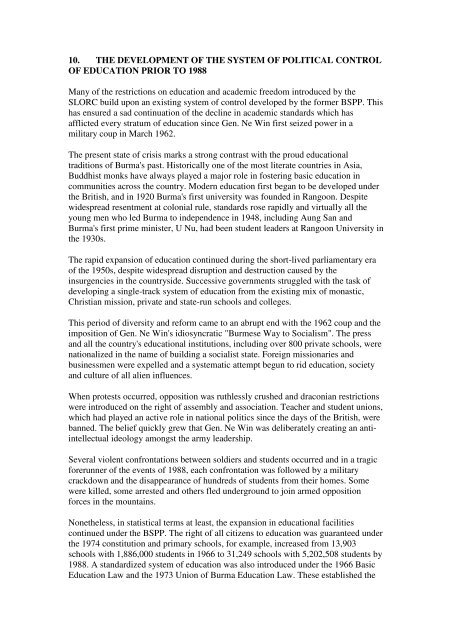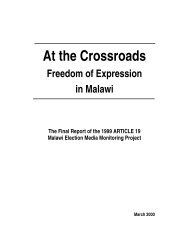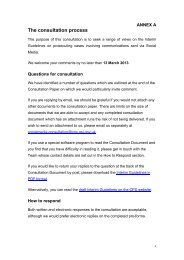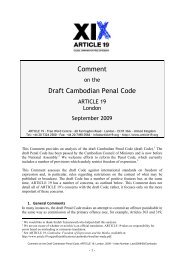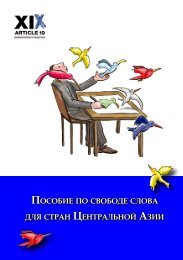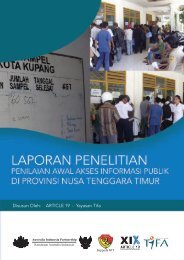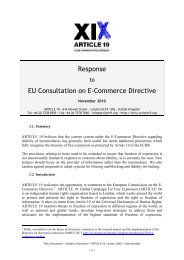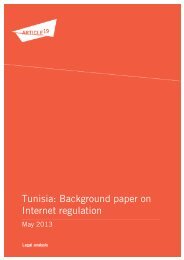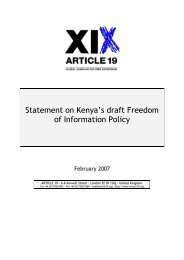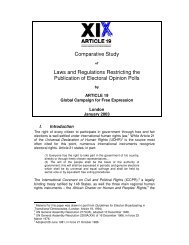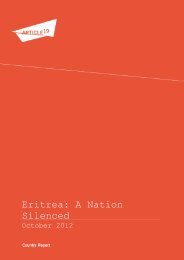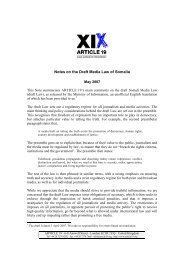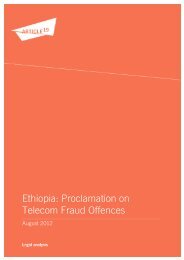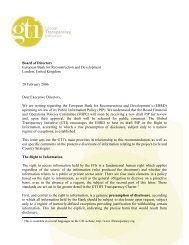"OUR HEADS ARE BLOODY BUT UNBOWED ... - Article 19
"OUR HEADS ARE BLOODY BUT UNBOWED ... - Article 19
"OUR HEADS ARE BLOODY BUT UNBOWED ... - Article 19
You also want an ePaper? Increase the reach of your titles
YUMPU automatically turns print PDFs into web optimized ePapers that Google loves.
10. THE DEVELOPMENT OF THE SYSTEM OF POLITICAL CONTROLOF EDUCATION PRIOR TO <strong>19</strong>88Many of the restrictions on education and academic freedom introduced by theSLORC build upon an existing system of control developed by the former BSPP. Thishas ensured a sad continuation of the decline in academic standards which hasafflicted every stratum of education since Gen. Ne Win first seized power in amilitary coup in March <strong>19</strong>62.The present state of crisis marks a strong contrast with the proud educationaltraditions of Burma's past. Historically one of the most literate countries in Asia,Buddhist monks have always played a major role in fostering basic education incommunities across the country. Modern education first began to be developed underthe British, and in <strong>19</strong>20 Burma's first university was founded in Rangoon. Despitewidespread resentment at colonial rule, standards rose rapidly and virtually all theyoung men who led Burma to independence in <strong>19</strong>48, including Aung San andBurma's first prime minister, U Nu, had been student leaders at Rangoon University inthe <strong>19</strong>30s.The rapid expansion of education continued during the short-lived parliamentary eraof the <strong>19</strong>50s, despite widespread disruption and destruction caused by theinsurgencies in the countryside. Successive governments struggled with the task ofdeveloping a single-track system of education from the existing mix of monastic,Christian mission, private and state-run schools and colleges.This period of diversity and reform came to an abrupt end with the <strong>19</strong>62 coup and theimposition of Gen. Ne Win's idiosyncratic "Burmese Way to Socialism". The pressand all the country's educational institutions, including over 800 private schools, werenationalized in the name of building a socialist state. Foreign missionaries andbusinessmen were expelled and a systematic attempt begun to rid education, societyand culture of all alien influences.When protests occurred, opposition was ruthlessly crushed and draconian restrictionswere introduced on the right of assembly and association. Teacher and student unions,which had played an active role in national politics since the days of the British, werebanned. The belief quickly grew that Gen. Ne Win was deliberately creating an antiintellectualideology amongst the army leadership.Several violent confrontations between soldiers and students occurred and in a tragicforerunner of the events of <strong>19</strong>88, each confrontation was followed by a militarycrackdown and the disappearance of hundreds of students from their homes. Somewere killed, some arrested and others fled underground to join armed oppositionforces in the mountains.Nonetheless, in statistical terms at least, the expansion in educational facilitiescontinued under the BSPP. The right of all citizens to education was guaranteed underthe <strong>19</strong>74 constitution and primary schools, for example, increased from 13,903schools with 1,886,000 students in <strong>19</strong>66 to 31,249 schools with 5,202,508 students by<strong>19</strong>88. A standardized system of education was also introduced under the <strong>19</strong>66 BasicEducation Law and the <strong>19</strong>73 Union of Burma Education Law. These established the


